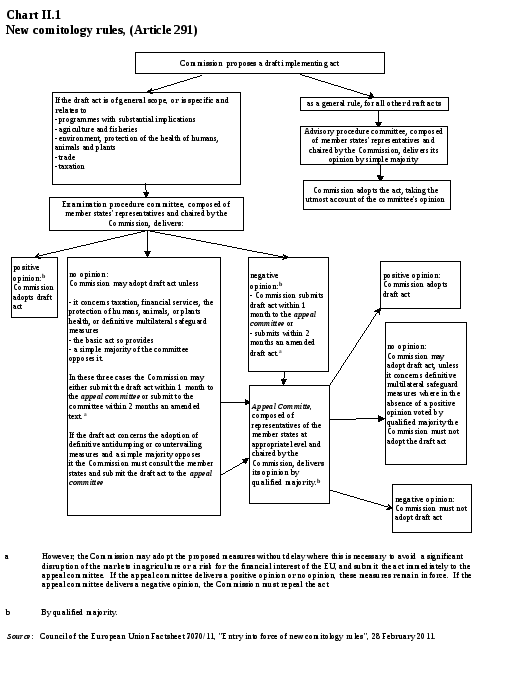
|
European
Union WT/TPR/S/248/Rev.1
Page |
-
Trade policy regime
-
Legal and Institutional Framework
-
The entry into force of the Lisbon Treaty in December 2009 brought about major changes to the legal and institutional framework for EU trade and investment policy. The Lisbon Treaty amends the Treaty on European Union, signed in Maastricht in 1992, and the Treaty establishing the European Community, signed in Rome in 1957, and renamed the Treaty on the Functioning of the European Union (TFEU).1 Together, the two amended treaties establish and govern the operation of the EU. By virtue of the Lisbon Treaty, the EU replaces and succeeds the European Community.2
-
External trade policy, that is, trade policy regarding non-EU countries, is an area of exclusive EU competence. This means that only the EU can adopt legally binding acts in this area; member States may do so only if empowered by the EU, or to implement EU acts. The Lisbon Treaty broadens the scope of the EU's external trade policy to encompass foreign direct investment, thus establishing the EU's exclusive competence in this area.3 Prior to the Lisbon Treaty, foreign direct investment was partially within the scope of the EU's external trade policy. The term "direct investment" has been interpreted by the Court of Justice of the EU to cover investment that serves to establish lasting and direct links with the undertaking to which capital is made available to carry out an economic activity (see also Chapter III(3)(i)).4
-
The Lisbon Treaty expressly states that the EU's external trade policy covers trade in services and the trade aspects of intellectual property rights, along with trade in goods and foreign direct investment.5 Although the Treaty of Nice had previously brought services and trade-related intellectual property rights into exclusive EU competence as part of the EU's external trade policy, there were some exceptions. Member States retain varying degrees of independent regulatory authority, which may result in the adoption of national measures that affect trade within the EU, and with non-EU countries.
-
Under the Lisbon Treaty, framework legislation on external trade policy must be adopted by the European Parliament and the Council in accordance with the "ordinary legislative procedure".6 Previously, external trade legislation was adopted by the Council alone, and did not involve the European Parliament. Apart from external trade policy, the Lisbon Treaty extends the ordinary legislative procedure to some 40 new cases of decision making in several policy areas, including the common agricultural policy and the common fisheries policy.7
-
Under the ordinary legislative procedure, only the Commission can put forward legislative proposals, with some exceptions.8 The European Parliament and the Council may amend the proposals. If the Parliament and the Council cannot reach agreement on draft legislation at second reading, a conciliation committee composed of equal numbers of representatives from both institutions is convened to negotiate a joint text. If the conciliation committee reaches an agreement, the text can be adopted as an EU act. The Parliament and the Council agree on most legislative proposals at first or second reading.
-
With the entry into force of the Lisbon Treaty, "comitology" is being replaced by a new legal framework. Comitology refers to the procedure whereby committees composed of representatives from member States control the Commission in the exercise of the "implementing powers" conferred on it by the legislator.9 Critics viewed the comitology procedure as opaque and failing to provide stakeholders with the necessary information.10 According to the Commission, the new legal framework will increase the transparency of the system for the Council and the European Parliament.
-
The new legal framework is based on the distinction introduced by the Lisbon Treaty between "delegated acts" and "implementing acts".11 The Commission may adopt a delegated act, defined as a "non-legislative act of general application", to make certain changes to EU acts. These changes may be necessary in the interest of efficiency, for example to ensure that technical regulations or sanitary and phytosanitary measures take account of scientific progress or specific events, without the need to adopt legislation (Chapter III(1)(viii) and (ix)). The power to adopt delegated acts may be conferred on the Commission only by means of an act adopted by legislative procedure, and may be used to supplement or amend certain "non-essential" parts of that act.12 The Commission's exercise of delegated powers is subject to control by the European Parliament and the Council.
-
For EU acts that require uniform implementation across member States, the Lisbon Treaty generally requires the adoption of implementing acts by the Commission.13 This is subject to the control of member States, in accordance with the "new comitology rules" that entered into force in March 2011 (Chart II.1). The Commission considers that it has acquired "a greater political responsibility".14 This is mainly because, under the new rules, if a committee composed of member State representatives fails to reach a qualified majority against or in favour of the Commission's draft implementing act, the Commission has the choice between adopting or reviewing the draft act. Definitive multilateral safeguards are the only exception, since their adoption requires the support of the qualified majority of member States. Other contingency measures are subject to the standard new comitology rules (see Chapter III(1)(vi)).
-
-

